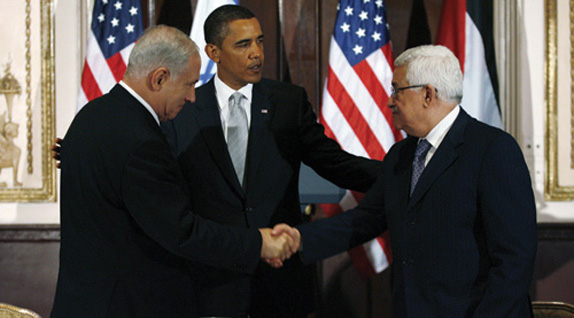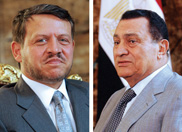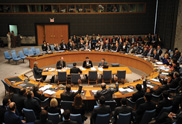 John Angelillo-Pool/Getty Images
John Angelillo-Pool/Getty Images
Article
Everybody wants peace, yet no one delivers. What is the answer?
Learn the why behind the headlines.
Subscribe to the Real Truth for FREE news and analysis.
Subscribe NowWorld peace. Those two words bring to mind stereotypical images: a plastic-faced, beauty-pageant winner reciting an over-rehearsed answer between flashes of her bleached toothpaste-ad smile; a worn peace symbol sewn on a hippie’s backpack; or a photo of children in a poor nation flashing the two-fingered peace sign.
Similar to these clichés, hardly anything can seem more trite or naïve than the desire for world peace. Yet nearly everyone longs for it.
Man’s ever-present problems remain obvious to politicians, who must at least acknowledge them—pollution, disease, poverty, war and starvation. Although critics say they bring up these issues purely for political gain, most world leaders appear sincere. Many of these men and women genuinely care about their nation and their fellow countrymen.
Even though there is not peace on Earth, it is not for lack of trying: the United Nations attempts to bring it to the world; the European Union seeks to unify a continent; presidents and prime ministers desire it for their nations.
Yet nation fights nation, drug lords bring countries to their knees, citizens riot when their sports team wins the championship, and cities brim with murder.
The Politics of Peace
Political press conferences and televised speeches are often laced with the “p” word. Calls for peace involve proposed international cooperation or programs to bring stability to struggling locales.
 Khaled Desouki/AFP/Getty Images
Khaled Desouki/AFP/Getty ImagesTake the Middle East. The Israelis and Palestinians have sought peace for decades, but to no avail.
Refusing Palestinian preconditions for future peace talks, Israeli Prime Minister Benjamin Netanyahu said, “I hope very much that the Palestinians will come to their senses and enter the peace process…The peace process is an Israeli interest as much as it is a Palestinian one” (AFP).
In response, Jordan’s King Abdullah II met in Cairo with Egyptian President Hosni Mubarak. Both leaders insisted “on the need for an immediate halt of all Israeli unilateral actions, which undermine the chances of achieving peace, especially the settlement construction” (The Associated Press).
What about Russia? President Vladimir Putin told citizens a vote for his United Russia party in an upcoming election would aid in the peace effort: “Stability and peace on our land have not fallen from the skies, they haven’t yet become absolutely, automatically secured. This is the result of a very fierce fight, both inside the country and in the international arena” (AP).
Then there are the efforts between China and the United States to denuclearize North Korea. Following the China-U.S. Strategic and Economic Dialogue in July 2009, Xinhua News Agency paraphrased Chinese President Hu Jintao’s comments on the responsibilities of the two nations on the global stage.
“As two countries with significant influence in the world, China and the United States also enjoy extensive common interests and broad space for cooperation,” President Hu said. Xinhua also summarized him as saying “that both China and the United States shoulder important responsibilities on a host of major issues concerning peace and development of mankind.”
In a letter delivered to North Korean leader Kim Jong-il, President Hu said, “China’s consistent goal is the denuclearization of the Korean Peninsula to safeguard and promote peace, stability and development of northeast Asia…” (ibid.).
Religions also cry for peace.
After his trip to the Holy Land, Pope Benedict XVI told the congregation in Cassino, Italy, “As you know, in my recent trip to the Holy Land, I went as a pilgrim of peace, and today…have the opportunity to emphasize, once again, that peace is in the first place a gift of God, and therefore its power is in prayer” (Zenit).
“Once again I would repeat that military options are no solution and that violence, wherever it comes from and whatever form it takes, must be firmly condemned. I express my hope that, with the decisive commitment of the international community, the ceasefire in the Gaza strip will be re-established—an indispensable condition for restoring acceptable living conditions to the population—and that negotiations for peace will resume, with the rejection of hatred, acts of provocation and the use of arms” (ibid.).
United States President Barack Obama told reporters of progress in the Iraq War, “The United States will continue to stand with Iraq as a strong partner and as a friend. Tough challenges remain and I’m sure that there will be difficult days to come. But this agreement advances the political progress that can bring lasting peace and unity to Iraq, and allow for the orderly and responsible transition of American combat troops out of Iraq by next September.”
In response to Mr. Obama winning the prestigious Nobel Peace Prize, Brazilian President Luiz Inácio Lula da Silva said it was in “good hands,” expressing “hope that world peace is a reality and that we have no more nuclear bombs” (AFP).
Ironically, to achieve even short periods of peace, man thinks he must often engage in the opposite—war.
“Only power could protect peace,” China’s People’s Liberation Army Air Force Commander Xu Qiliang said, adding, “As the air force of a peace-loving country, we must forge our swords and shields in order to protect peace” (Xinhua).
The idea that war can bring peace is not new.
During the Yalta Conference at the end of World War II, U.S. President Franklin Roosevelt, British Prime Minister Winston Churchill and USSR leader Joseph Stalin signed an agreement stating, “It is our inflexible purpose to destroy German militarism and Nazism and to ensure Germany will never again be able to disturb the peace of the world.”
In his autobiography, Sir Winston Churchill said that “those who can win a war well can rarely make a good peace, and those who could make a good peace would never have won the war.”
Even ancient Greek scholars agreed. Aristotle once said, “We make war that we may live in peace.”
Manmade Answers
World leaders are seemingly the only ones in a position to end worldwide strife. These are highly educated men, often graduates of the world’s preeminent universities. Once in office, they gather the top experts in every field to advise them. If anyone has a chance of obtaining peace, it is them.
 Mario Tama/Getty Images
Mario Tama/Getty ImagesTheir answer?
The United Nations, which regularly assembles almost 200 nations to discuss issues threatening the globe. Yet the democratic process slows any progress to a near-standstill.
The EU has also wanted to bolster European peace for decades. Yet it has only recently been able to force through a constitution—after putting it under the guise of a more easily ratified treaty.
A cursory glance at civil-war-torn Democratic Republic of Congo will tell you that individual nations cannot even find peace.
Cities also struggle to keep it. Look at Mexico’s Ciudad Juarez, where machine-gun-wielding gang members fearlessly kill police officers.
Families have problems too—a shouting match over financial troubles, an ill-disciplined child disobeying his father’s direction, or a sibling dispute that ends in a fist fight.
In the end, getting just two people to live peacefully seems impossible.
Why? The problem lies on the individual level.
After a life of revolutionizing both science and war, Albert Einstein famously concluded, “The real problem is in the hearts and minds of men. It is not a problem of physics but of ethics. It is easier to denature plutonium than to denature the evil from the spirit of man.”
Abraham Lincoln saw it this way: “Human action can be modified to some extent, but human nature cannot be changed” (The Lincoln Encyclopedia).
Robert McNamara, U.S. Secretary of State during much of the Vietnam War, said at the end of the documentary film Fog of War, “You can’t change human nature. It tells you that all of the other lessons are valueless, that the human situation is indeed hopeless.”
Thousands of years ago, the Bible outlined man’s true nature: “The way of peace they know not; and there is no judgment in their goings: they have made them crooked paths: whosoever goes there shall not know peace” (Isa. 59:8).
This is re-emphasized in the book of Romans, “And the way of peace have they not known” (3:17).
Further, Romans also states, “There is none righteous, no, not one” (3:10).
Together, these quotes paint a bleak picture. The historic record proves these statements to be true—manmade solutions always lead to more wars, ruin, misery, death and destruction.
Yet engrained in man is a desire for something better. Despite his failure to bring lasting peace, man still strives for it, yearns for it. But thankfully, these hopes will be fulfilled—and soon!
Watch The World to Come video broadcast “The New World Order – How Peace Will Come!” to find out how.
More on Related Topics:
- In a Nigerian Village, Extremists Issued a Call to Prayer and Then Slaughtered Those Who Turned Up
- Sudanese Paramilitary Force Abducting Children in Darfur, Witnesses Say
- Nigeria’s Northeast Faces Worst Hunger in a Decade as Aid Cuts Hit Region, UN Says
- Uganda Shuts Down Internet Ahead of Election, Orders Rights Groups to Halt Work
- Sudan’s Top General Rejects U.S.-Led Ceasefire Proposal, Calling It ‘The Worst Yet’


